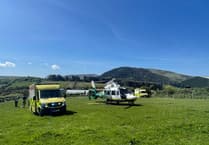Measures to prevent Foot and Mouth Disease (FMD) from reaching the island have been strengthened following a confirmed case in Germany last week.
The Department of Environment, Food and Agriculture (DEFA) has said it has moved swiftly to update legislation, aiming to safeguard farmers, livestock, and the island’s agricultural economy.
This action aligns the island with the UK, which banned commercial imports of cattle, sheep, pigs, deer, buffalo, and their products (such as meat and dairy) from Germany on Wednesday.
Travelers are also prohibited from bringing meat, dairy, or animal products, even if commercially packaged.
In line with the UK, further measures have been introduced, including restrictions on the import of untreated wool and hair from susceptible animals and animal casings (obtained from intestines) from countries outside the British Isles that are not recognized as FMD-free.
Chief veterinary officer Dr Amy Beckett said: ‘These robust measures are essential to protect the island’s important agricultural sector. Vigilance and adherence to biosecurity are vital to preventing the spread of this devastating disease.
‘While FMD poses no risk to human health, it is highly contagious in cloven-hoofed animals, such as pigs, sheep, and cattle, and can lead to significant economic losses.’
Although no cases have been reported in the British Isles this year, previous outbreaks of the disease in 2001 and 2007, led to millions of livestock animals being slaughtered and cost the public and private sectors billions of pounds.
Farmers are urged to maintain strict biosecurity measures to protect their herds and monitor animals for clinical signs, such as blisters, lameness, or fever.
FMD is a legally notifiable disease, meaning it is an offence not to report a case to the government. Anyone that suspects a case must call DEFA immediately on 685844.
For more information and guidance, visit the DEFA website.




.jpeg?width=209&height=140&crop=209:145,smart&quality=75)